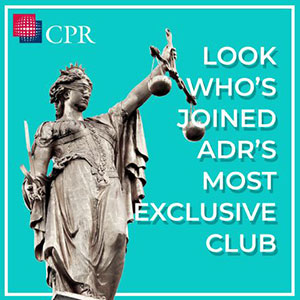CPR Neutrals Are Experienced and Knowledgeable
500+ Neutrals 35 Countries Represented 40+ Languages Spoken
CPR supports a diverse and inclusive Panel of Distinguished Neutrals, from which arbitrators, mediators, and other dispute management professionals are selected to help parties prevent and resolve their disputes.
It includes prominent attorneys, retired state and federal judges, academics, as well as highly-skilled business executives, legal experts and dispute resolution professionals who are particularly qualified to resolve all business and employment disputes, including those involving multi-national corporations, as well as smaller companies, or issues of public sensitivity.
42% of our roster self-identify as women, persons of color, members of the LGBTQ community, persons living with disabilities, or other under-represented groups.
Focusing in more than 30 practice areas, CPR’s esteemed arbitrators and mediators have provided resolutions in thousands of cases, with billions of dollars at issue worldwide. For more information on our specialty panels, see Specialty Panels.
CPR's Panel of Distinguished Neutrals is publicly available online. To view our full roster, please visit: Find a Neutral.
Admission Process
Admission to the Panel of Distinguished Neutrals is a selective process. In evaluating applications, CPR considers candidates’ education, experience with commercial or consumer matters, ADR training, ADR experience, and references. From time to time, CPR will convene review committees comprising CPR Institute members with experience in ADR matters and Neutrals to review the applications to help CPR evaluate the substantive experience of candidates in a given field. CPR strives for geographic and other diversity in the roster of the Panel. All CPR Neutrals are expected to meet certain training requirements, and to maintain the highest ethical standards as set out by the governing ethical codes and rules. See generally, Become a Neutral.
The Neutrals, when selected for a matter, are independent contractors. They have no ownership interest in CPR, a not-for-profit organization, and receive no funding from CPR. The Neutrals located in the US pay an annual Neutral Administrative Fee based on the number of Panels on which they are listed, as well as 5% of fees earned on CPR matters to which they are selected. These administrative fees, among other things, contribute to defraying the administrative costs of maintaining their biographical and profile data on the web and in CPR’s databases, as well as the costs of providing trainings and forums for sharing best practices and approaches among neutrals and other practitioners, and promotional activities related to CPR Neutrals. Many of the Neutrals also elect to participate and contribute donations as members in the activities and offerings of the CPR Institute.
